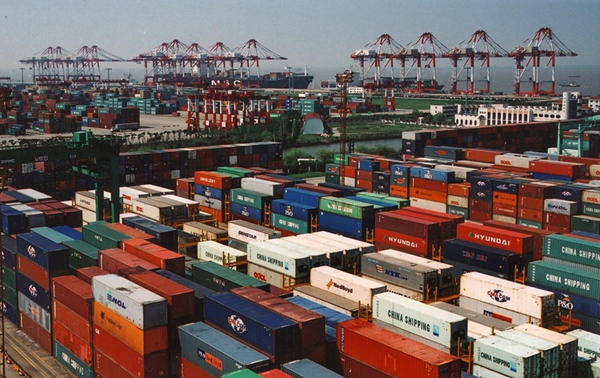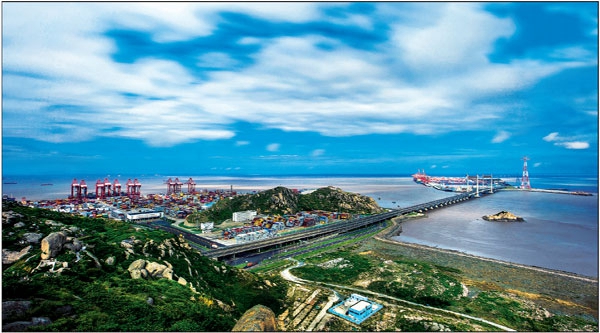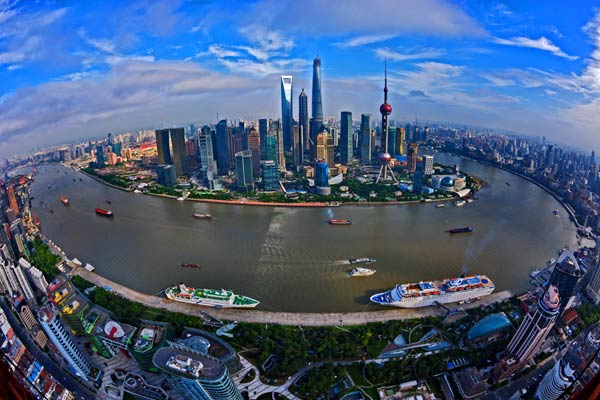Pudong New Area promotes shipping system innovation

A view of shipping containers in Shanghai's Pudong New Area. [Photo provided by Pudong New Area/chinadaily.com.cn]
The 2019 key work arrangement for Pudong New Area to build the core function area of the Shanghai International Shipping Center was officially issued, highlighting key concepts such as the new areas of the China (Shanghai) Free Trade Zone, the integrated development of the Yangtze River Delta, and Belt and Road construction.
Based on the arrangement, Pudong will enact five major measures to promote the construction of the core function area.
It will promote shipping development through institutional innovation and deepen reform of the free trade zone. It will focus on strategy and precision investment to accelerate the comprehensive gathering of shipping elements resources.
It will also strive to meet the highest international standards and continue to improve the shipping business environment.
In addition, Pudong will strengthen international cooperation and exchanges to enhance the influence of its shipping reach, and will also optimize the hub port distribution system to serve the integration of the Yangtze River Delta region.
The arrangement proposes 35 tasks to further enhance the comprehensive resource allocation capacity of the core function area of the shipping center.

As one of the busiest container terminals in the world, Yangshan Deep Water Port, part of the China (Shanghai) Pilot Free Trade Zone has solidified Shanghai's position as an international shipping hub. [Photo by Zhan Donghua /For China Daily]
Pudong is actively contributing to the construction of Shanghai FTZ new areas, working towards creating an internationally recognized free trade zone with strong competitive characteristics.
It has studied the opening-up policies and systems with strong international market competitive characteristics, helping formulate the construction plan for the new areas. Creating the arrangements designed to serve the new areas is one of the important tasks.
Pudong has proposed to set the highest international standards and best level as its benchmark, exploring an open shipping policy system with international market competitiveness, as well as promoting the implementation of a highly open international transportation management and ship registration system.
Data shows that there are 25 foreign-funded international ship management enterprises, including 16 wholly foreign-owned enterprises in the free trade zone. Among them, 17 foreign-funded enterprises were established after September 2013 when the free trade zone was established. The total number of foreign-funded enterprises is 3.1 times higher than that as of before one and the total number of wholly foreign-owned enterprises is 5.3 times higher.
The world's three major international ship management companies, namely V.Group, Anglo-Eastern Group, and Bernhard Schulte Shipmanagement, have all settled in Pudong, showing full recognition for the free trade zone’s business environment and the opening up of its shipping services.
As a high-end part in the shipping industry chain and value chain, the international ship management industry has a wide range of penetration, and has strong economic effects spreading across upstream and downstream industries, such as shipping finance and ship replenishment.
The Pudong New Area Commission of Commerce has learned from a survey that the international ship management enterprises are mainly faced with difficulties in tax management, cross-border settlement, and customs clearance. As a result, some enterprises cannot conduct business and others chose to arrange high-value-added business overseas, which cannot effectively achieve resource concentration and its driving effect.
The arrangement proposes to optimize the port supervision mode and expand the implementation of a coastal piggyback transport policy by taking advantage of the construction of the new areas.
The Pudong Shipping Center will serve the integrated development of the Yangtze River Delta region, accelerating the implementation of the tax rebate policy for the port of departure and integrating the eligible ports along the Yangtze River.

A view of the Pudong New Area in East China's Shanghai. [Photo/YANG HUANMIN AND JIN RONG FOR CHINA DAILY]
It will encourage international ship management enterprises to provide cross-border taxable services to overseas ship owners and exempt them from value-added tax.
It will continue to optimize the operational convenience of international ship management in foreign exchange and customs clearance, promote the construction of a public service platform for bonded ship supply materials, simplify the document operation process in the special customs supervision area, innovate its supervision mode, and improve transit convenience.
In terms of the "hardware" of shipping construction, the initial establishment of the inland harbor basin project in Waigaoqiao inland river container port area has been approved.
The second phase of the Dalu waterway improvement project has entered a partial completion stage. The east extension of the Zhaojiagou waterway improvement project has reached 90 percent completion.
This year, the construction of the Port Container Truck Center will begin. The Shanghai South Port and its adjacent waters will be integrated into specific routes in the specific sea areas of the East China Sea. The transformation of Shanghai South Port and the construction of railway freight lines will also be promoted.


 China's public holidays for 2025
China's public holidays for 2025  Shanghai FTZ: Go all out to build China's first pilot zone for Silk Road E-commerce cooperation
Shanghai FTZ: Go all out to build China's first pilot zone for Silk Road E-commerce cooperation  Favorable policies boost 'China Travel' trend
Favorable policies boost 'China Travel' trend  play
play 